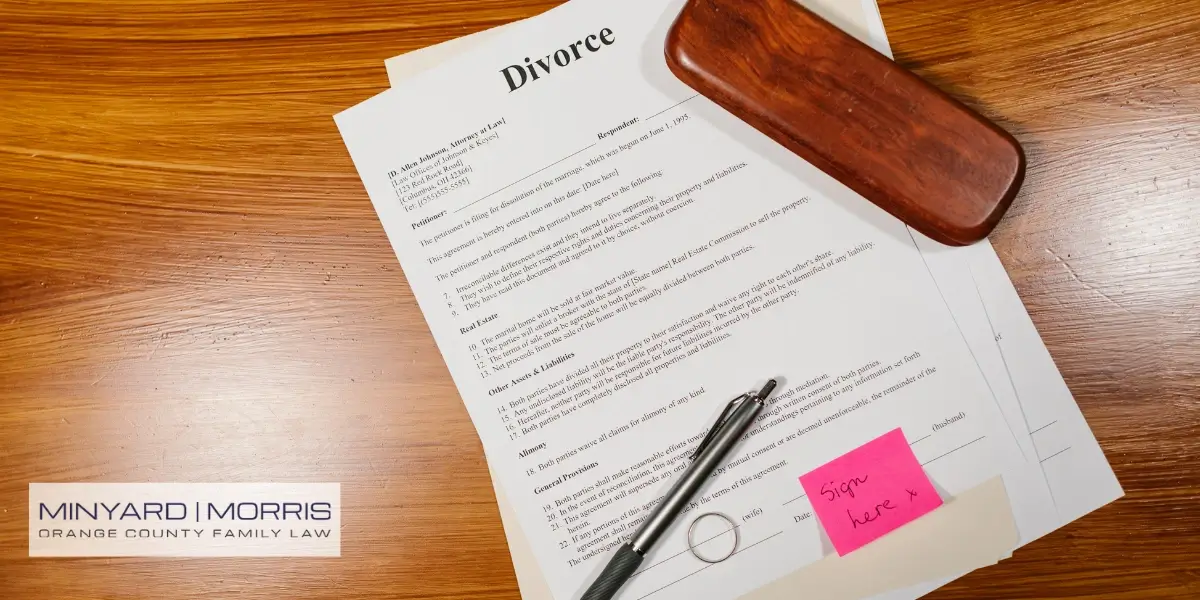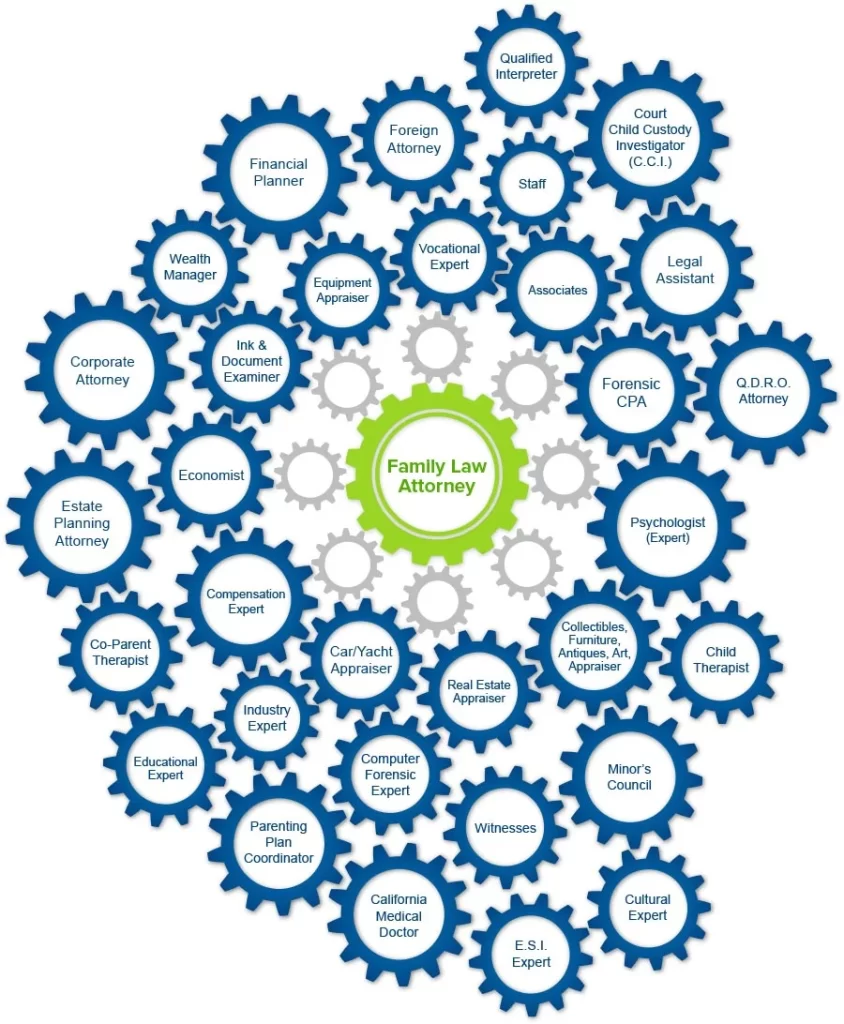Orange County Divorce Lawyer
Orange County Divorce Attorney
Divorce is one of the most challenging experiences a person can face. The right attorney can make all the difference. At Minyard Morris, our Orange County divorce lawyers provide trusted legal guidance, ensuring you have a reliable, experienced, and compassionate advocate by your side. We are dedicated to delivering the highest quality legal representation to help Orange County residents navigate this difficult time with confidence.

At Minyard Morris , our team of 20 family law attorneys will creatively focus their efforts on ensuring that you have the strategic advice you need for a successful divorce, whether it is a high net worth divorce or a more traditional one. As a family law firm that has been serving Orange County clients for over 48 years, we understand that there is more than one path to the dissolution of a marriage. We opened our doors for business in 1977.
As a client of Minyard Morris , you will receive a specifically selected Orange County family law attorney to represent you throughout your case. In addition, our entire team of divorce attorneys meet in person three times weekly to discuss strategy and resolution of our firm’s cases. So you will also receive the experience and insight of 20 family law attorneys dedicated to working exclusively on Orange County family law matters.
Most Orange County divorces address certain cornerstone issues, including:
- Division of property – You will want to advise your lawyer as to your desires regarding the division of property, from the furniture to investments.
- Child custody and parenting plans – If you have children, the court will expect you to create a proposed plan for allocating parenting responsibilities. This step can be emotional and difficult, but we are here to help you protect your relationship with your child and your rights.
- Child support – Child support payments are calculated based on a formula established under California law, and depends on many factors. We will show you the actual program printouts so you will know what to anticipate.
- Spousal support – Our divorce attorneys have extensive experience with the Orange County courts and understand the most effective strategies for protecting our clients’ financial future.
Selecting an Orange County Divorce Lawyer
The 20 divorce lawyers of Minyard Morris have nearly 350 years of combined experience as lawyers which we leverage for benefit of our Orange County family law clients. Before hiring an Orange County divorce lawyer, take the time to carefully compare lawyers and law firms. No two divorce lawyers are the same, in the same way all clients are different.
There are over 600 divorce lawyers serving Orange County. They cannot all be the right lawyer for you. You will not accidentally find the “right” one for you and your case. You will only retain the divorce lawyer that is competent and aligned with your objectives if you perform proper due diligence.
Don’t look back years from now and regret having hired the wrong divorce lawyer because you spent less time investigating who to retain than you spent deciding what color to paint your kitchen or which tires to buy for your car. A very good starting place for conducting research is an Orange County divorce lawyer’s website and internet reviews.
Strong Negotiations and Litigations Skills
Our objective is to achieve amicable solutions through negotiation. Our goal is to protect the rights and interests of our Orange County clients, whether through a negotiated settlement or a court decision. Litigation should be the last resort, but if it is necessary, our divorce lawyers are skilled divorce attorneys.
Deep Local Knowledge
As a family law firm based in Orange County whose 20 divorce lawyers know the nuances of Family Law in Orange County. We are familiar with the judges, courtroom procedures, and other local divorce lawyers, which can be extremely helpful in resolving issues and cases of our Orange County clients. Our local knowledge allows us to navigate the system efficiently and effectively, ensuring that your case progresses as smoothly and as rapidly as possible.
Client-Centered Approach
We keep our Orange County clients informed at every stage of the case. We are available to answer any questions you may have. Minyard Morris divorce lawyers and staff do not work remotely. We are in the office and available to our Orange County clients.
Positive Outcomes and Testimonials
Why are we the largest family law firm based in Orange County? The answer is because Orange County knows that we are the “go to” divorce lawyers. Our success is measured by the positive outcomes we achieve and the glowing testimonials they provide. We have a powerful reputation built on over 46 years of exclusively handling Orange County family law cases. Retain the law firm Orange County knows and trusts. Our Orange County clients know that we won’t let them down.
Why Collaboration Sets Minyard Morris Apart for It’s Orange County Clients
At Minyard Morris, we’ve learned that the best results come from teamwork. For decades, we’ve dedicated ourselves to a collaborative approach that’s become the backbone of our success. Each week, our 20 skilled divorce lawyers gather for a series of intensive meetings, where we put our over 350 years of combined experience to work on behalf of our Orange County clients.
What We Do in Our Strategy Meetings
Every Monday at 5 p.m., Tuesday at noon, and Thursday at noon, our entire team of divorce lawyers comes together for focused discussions. These aren’t casual conversations; they’re deep dives into the cases we’re working on. Attendance is essentially mandatory, and every divorce lawyer contributes their knowledge and perspective to ensure we’re covering every aspect of each case.
In these sessions, we tackle a range of critical topics. We discuss how to approach bomb throwing opposing counsel, identify the best strategies for dealing with the specific judicial officer assigned to a case, and examine the latest case law, recent seminars and our own past experiences with similar cases also come into play. We discuss settlement options, assess evidentiary issues, and debate trial strategies. And through it all, we keep our Orange County client’s goals front and center, exploring every possible way to achieve the best outcome.
Well Known Reputation for Collaboration
Within the family law community, our commitment to these meetings is well-known. Attorneys and judicial officers often ask us about our process, curious about the impact of our teamwork. This reputation helps us attract top legal talent—divorce lawyers who want to be part of a firm that values collaboration and leverages a team-based approach. After all, not many firms can say they bring the combined expertise of 20 divorce lawyers into every case-most likely no other firm.
The Benefit to Our Orange County Clients
So, what does this mean for you as our client? Quite simply, it means that when you hire Minyard Morris, you’re not just getting one divorce lawyer; you’re getting the power of a team. Imagine having 20 divorce lawyers brainstorming, strategizing, and lending their experience to your case. Compare that to smaller firms, where a divorce lawyer might have only one or two colleagues to consult with—it’s clear that our approach provides a distinct advantage. That is immeasurable.
Here’s an example of how this works in practice: say one of our divorce lawyers faces a novel question. During a meeting, they bring it up for discussion, and another divorce attorney—who’s handled a similar issue—can immediately share their experience. This exchange of knowledge provides immediate direction, saving time (and attorneys fees) and ensuring that our approach is informed by the firm’s collective experience.
Sometimes, these meetings are simply a reality-check of the issues in a case, weighing the chances of success in front of a particular judge, or debating which expert witness would best strengthen our position. Often, we brainstorm creative ways to structure settlements, discussing objectives raised by the other divorce lawyer and exploring every possible solution. The topics are wide-ranging, but the goal is always the same: to ensure our clients receive the best representation possible.
An Investment in Excellence
We invest a significant amount of time in these meetings, and it’s an investment we make at no cost to our Orange County clients. With attorneys’ hourly rates ranging from $375 to $900, the internal expense is substantial. Yet, we’ve remained committed to this process for decades because we believe it’s one of the most valuable things we do. While other firms may have the occasional chat about a case, none do it with the same frequency, structure, robustness or intensity as we do.
This level of collaboration is one of the things that sets Minyard Morris apart. Our goal is simple: to provide exceptional service and achieve the best results for our Orange County clients. Our team meetings are a critical part of fulfilling that promise. When you work with us, you’re not just hiring one divorce lawyer; you’re engaging a team of dedicated professionals who bring their collective knowledge to bear on every case. That’s the Minyard Morris difference.

Divorce Requires a Review of Future Plans
Once your divorce is final, you will undoubtedly be anxious to put your past behind you and begin your new future. Before you do, however, you have one more matter to address. You should review and update your estate planning documents. Updating these documents is vital to the future of your family and finances.
At Minyard Morris, our dedicated Orange County divorce attorneys have over 350 years of combined legal experience. We understand the importance of estate planning, especially as it pertains to divorce, and are here to advise you regarding the importance of these issues and refer you to a competent estate planning attorney.
Top 5 Documents to Review and Update After a Divorce
Although our clients’ estate plans vary widely in complexity, they all contain certain basic components. Regardless of the nature of your estate plan, we recommend that you review the following five aspects of your plan:
- Update your will. Make sure to update the language of your last will and testament to reflect the fact that you and your spouse are no longer married. While California law revokes any bequests that your will makes to your former spouse after a divorce, you still need to consider how to redistribute those bequests and name an executor. If you have never had a will, now is the time to have one prepared.
- Designate a new health care agent. If your former spouse is your current health care agent, you may want to update your advance health care directive to appoint a trusted friend or family member.
- Create a new power of attorney. If you named your former spouse as your financial power of attorney, you should revoke this document and create a new one.
- Remove your former spouse as the trustee of any trust. Your ability to alter a trust may depend on the type of trust. We highly recommend that you discuss changes to your trust with your estate planning attorney.
- Revise your beneficiary designations. Many types of insurance policies and investment accounts allow you to designate a beneficiary in the event of your death. In most cases, you will not want your former spouse to be that beneficiary after your divorce.
Plan Well for the Future
We also advise our clients to review their estate plans after any major life event that could alter their wishes. Many people find new relationships after a divorce. The best way to protect your children and assets in a subsequent marriage is often through a prenuptial agreement. A prenuptial agreement can ensure that both spouses understand what will happen should the marriage last less than a lifetime, and it’s important to understand what can legally be included in a prenup under California law.
Work With A Team Of Highly Rated Divorce Attorneys
At Minyard Morris, we understand how important a secure future is to you and your family. When you work with an attorney at our firm you get the dual benefits of a dedicated attorney for your case, as well as the collaboration of our entire team of 20 experienced divorce attorneys. Contact our office in Newport Beach by calling 949-724-1111 or completing our online contact form.
What Role Do Experts Play in Divorce Litigation?

In divorce matters, the divorce lawyer establishes the strategy and execute the plan, but experts often play a critical role in the outcome of the case. Retaining the right expert is extremely important. As with divorce lawyers, all experts are not created equal. An incompetent or unqualified expert can destroy a case.
Family law is far more complex than is generally understood. It is litigation not unlike business litigation. The Evidence Code and the Code of Civil Procedure apply in divorce matters as they do in other types of litigation. A divorce is, to a large degree, the division of partnership assets. The same fiduciary duties exist between parties both before and after separation, as exist in corporate and partnership relationships. If civil cases don’t settle, they proceed to trial. The same is true of divorce matters.
Divorcing parties can agree to divide assets, resolve issues and settle their differences on almost any basis they choose. However, if they do not settle their conflicts, they may end up in a courtroom. Litigation may involve the testimony of experts. In a divorce, an expert is an individual who has special knowledge, skill, expertise, training or education that makes the expert’s opinions helpful to a divorce court on a contested issue. Experts are almost mandatory when certain issues are involved. The qualifications and credibility of an expert can be critical to the weight given to the expert’s opinions by the divorce court. The early retention of an expert can significantly enhance the chances of a favorable settlement.
Serving All Orange County
Choosing the “right” divorce lawyer and family law firm will make a real difference in the outcome of your case. Our Orange County family law firm combines expertise, experience, compassion, and a client-centered approach for residents of Orange County, to provide exceptional legal representation. Minyard Morris is dedicated to helping you navigate the complexities of family law with confidence and peace of mind.
Connect With A Team That Is On Your Side
Whether your Orange County family law matter is a high net worth divorce or a more traditional one, you should not face divorce alone. You need a team of proven professionals who will understand your goals and work to protect you and your rights every step of the way. That team is the Minyard Morris team. Contact our Newport Beach office at 949-724-1111 or via our confidential firm email to arrange your initial consultation.



